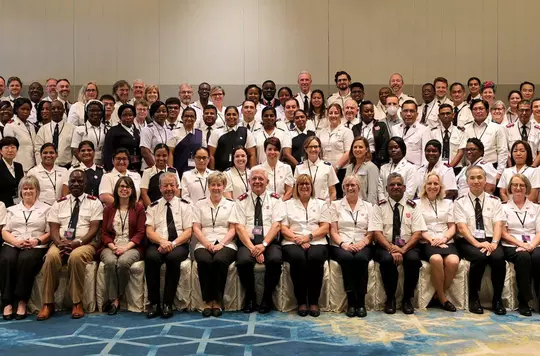6 February 2023
Are you wise or foolish? Building discipleship that lasts
Captain Callum Mckenna
Captain Callum McKenna challenges us to build a discipleship that will last all weathers.
Key text
Our summer placement as cadets was at Uxbridge in London. We had a friend come to stay and, unfamiliar with the area but in search of a restaurant, we decided to type ‘Chinese food’ into our sat-nav. You’ll imagine our surprise – and embarrassment – when we followed its instructions meticulously and drove down the flyover for Heathrow airport. It presumably thought our best chance at getting a Chinese meal involved boarding a plane. This probably ranks up there as one of the most foolish things I’ve ever done.
Pause and reflect
- What’s the most foolish thing that you’ve ever done?
The study passage we’re considering is really about the most foolish thing that we could ever do. When we think of a ‘fool’, our brains probably conjure up images of a person who is a bit daft, jokey or particularly prone to some kind of mishap. This picture, however, doesn’t do full justice to the depth of the word that Jesus uses in this familiar parable, which comes at the end of the Sermon on the Mount, his longest recorded sermon.
The Greek word employed to describe the sandy-land builder is móros. This is where the English word ‘moron’ comes from. Put plainly, Jesus is saying that this parable is about the stupidest things that a person could do. What are the silly mistakes that the person who builds their house on the sand makes?
The first foolish thing is that hearing does not result in doing.
It’s important to remember that this classic Sunday-school tale comes at the end of Jesus’ seminal speech about what life in his Kingdom – and a life shaped by following him – looks like. Through this parable, Jesus explains that those who have heard him but for whom his words make no difference are, quite simply, foolish. In other words, he is saying that if, for example, you’ve just heard him say ‘blessed are the peacemakers’, it would be foolish to walk around holding grudges. If you’ve heard him say ‘blessed are the poor’ but your life continues to be shaped by selfishness and greed then there’s something not very clever going on.
The thing that earns this particular builder the title of ‘foolish’ is that he knows what Jesus has said but he fails to do anything about putting Jesus’ words into practice.
Pause and reflect
- Can you think of examples of where you have not practised what you preach?
- What was the effect?
The second mistake the builder of the doomed house makes is thinking that today is for ever.
There are interesting parallels between the way that Jesus talks about the outcomes for the wise builder in verse 25 and the foolish builder in verse 27.
The circumstances faced by both are identical: the rain comes down, the streams rise and the winds beat against their houses. The only difference is that the house on the rock stands firm, while the house on the sand falls flat.
It seems that on a sunny day, without storms or inclement weather, a house is a house. But when the testing times come, what the builder did – or failed to do – makes all the difference. The foolish builder either didn’t foresee the inevitable squall or knew what would happen and chose not to build appropriately.
The same is certainly true of our faith. We aren’t called to be fair-weather Christians. Our relationship with God isn’t supposed to be something that we look to only when the storms and pressures of life come. The challenge is for us to develop a discipleship that will last whatever difficulties, tragedies and disappointments come our way. We do this by cultivating it whatever the season.
Pause and reflect
- How does your faith in Christ help you in difficult times?
- What do you do to develop your discipleship in less stormy seasons?
The final mistake the foolish builder makes is in trusting the words of anyone else other than Jesus.
This story is well known by many of us, but in its familiarity we’d do well not to miss two important sentences that bookend it. Jesus starts by saying ‘everyone who hears these words of mine’ (v24). Matthew wraps up the parable by saying: ‘When Jesus had finished saying these things, the crowds were amazed at his teaching, because he taught as one who had authority’ (vv28 and 29).
In a sense, the whole tale hinges on this. It boils down to understanding that at the centre of this story are the words of Jesus – the one who has complete authority and who is completely trustworthy. It is doing – or not doing – what Jesus says that makes the difference between a house that stays standing in a storm and a house that falls with a great crash.
We live in a world full of noises. Many voices compete for our attention. They readily offer advice and opinions for our lives. Yet, ultimately, it is what Jesus says that really matters. It is who Jesus says we are that really counts. It is what Jesus says about the kind of lives we should live that makes the real difference. According to this story, the wise thing to do is to listen to, and act upon, what Jesus says.
As John Gowans put it:
Nothing can I achieve, nothing attain;
He that without thee builds, labours in vain;
Shatter my own design,
Shaping a plan divine,
Come to this heart of mine,
Saviour, again.
(SASB 600)
Pause and reflect
- What are the other voices that compete for your attention?
- How can you listen to God?
Bible study by

Captain Callum McKenna
Mission and Ministry Formation Co-ordinator, William Booth College
Discover more

Lieut-Colonel Karen Shakespeare considers how harmony reveals the richness of God’s Kingdom.

Bethany Gibson reflects on her experience of being a UKI delegate at IHQ's Symposium on Human Sexuality.

Lieut-Colonel Jayne Roberts reflects on her experience of being a UKI delegate at IHQ's Symposium on Human Sexuality.

